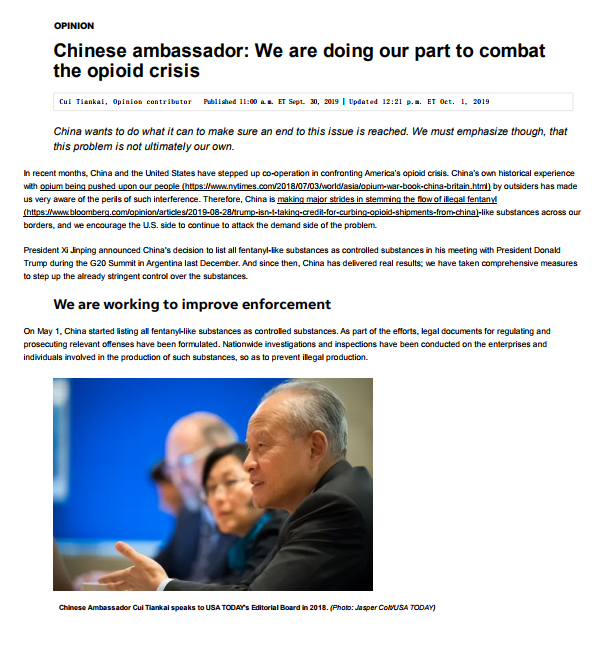 中文
中文
On September 30, 2019, Ambassador Cui Tiankai's op-ed was published by USA Today. Here is the full text of the article:
 |
In recent months, China and the United States have stepped up co-operation in confronting America’s opioid crisis. China’s own historical experience with opium being pushed upon our people by outsiders has made us very aware of the perils of such interference. Therefore, China is making major strides in stemming the flow of illegal fentanyl-like substances across our borders, and we encourage the U.S. side to continue to attack the demand side of the problem.
President Xi Jinping announced China's decision to list all fentanyl-like substances as controlled substances in his meeting with President Donald Trump during the G20 Summit in Argentina last December. And since then, China has delivered real results; we have taken comprehensive measures to step up the already stringent control over the substances.
We are working to improve enforcement
On May 1, China started listing all fentanyl-like substances as controlled substances. As part of the efforts, legal documents for regulating and prosecuting relevant offenses have been formulated. Nationwide investigations and inspections have been conducted on the enterprises and individuals involved in the production of such substances, so as to prevent illegal production.
Special operations have been launched to crack down on online sales of fentanyl-like substances. Logistic companies are urged to follow three rules: asking for real names of senders, opening packages to check contents, and conducting checks with security machines. In particular, high-risk international packages are screened more carefully at key customs checkpoints to intercept smuggled fentanyl-like substances. In addition, we are speeding up efforts to set up drug labs for technical support. More efforts are also being made to raise public awareness on this issue.
Thanks to earnest implementation of these various measures, significant progress has been achieved. According to a White House tweet dated Aug. 30, an official from the U.S. Customs and Border Protection (CBP) testified that the flow of deadly fentanyl from China has dropped "precipitously."
The Chinese government takes a zero-tolerance attitude towards drugs and strictly enforces anti-drug policies. Fentanyl-like substances for medical use legally produced in China have never flowed into the United States. Fentanyl products illegally processed for American markets, cracked by China's law-enforcement agencies, were all results of cross-border collusion, where the substances were disguised or hidden in international packages and mailed to the U.S. The amount involved is very limited.
We are not to blame for this crisis
Choking off the flow of illegal substances into the U.S. is a crucial step in combating opioid drug abuse, and China is doing its part. However, we cannot overstate the fundamental importance of preventing drug abuse in addressing the fentanyl issue in the United States. China is voluntarily joining the U.S. in an “all-of-the-above” strategy that counters both supply and demand, and we reject any effort to blame us or lay responsibility for the epidemic at our door.
There were media reports weeks ago about a seizure of 23 tons of fentanyl at Mexico’s biggest port, which were alleged to have been shipped from China to the U.S. These reports have been proved false.
China, the U.S. and Mexico have all confirmed that the cargo is not fentanyl nor chemicals controlled by the United Nations, the U.S. or China. Of course, the battle against illicit fentanyl-like substances is not over. The case in Mexico is still being investigated. Pinning blame on others is neither constructive nor practical.
China stands ready to cooperate and coordinate further with the U.S. on the highly complicated issue of fentanyl-like substance abuse. This must be done on the basis of mutual respect and understanding, not misplaced accusations and unfair recrimination. Working closely on this issue — which touches the lives of millions of Americans — also demonstrates China’s continued efforts for a stronger relationship.